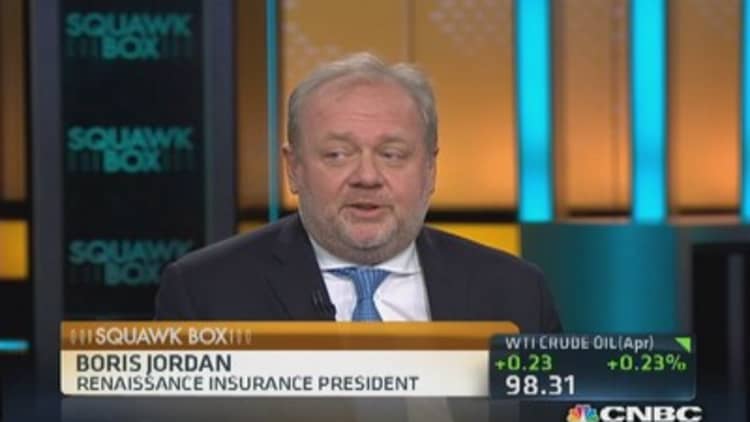Is the White House now giving out investment advice? It appears so.
"I wouldn't, if I were you, invest in Russian equities right now, ... unless you're going short," White House Press Secretary Jay Carney said Tuesday, in response to a question from a reporter.
The reporter pointed out the Russian market was on the rise, with Russia's key indexes, the RTS and the MICEX, gaining 4.18 percent and 4.06 percent, respectively, on Tuesday—and asked: "Is this a sign that the sanctions that we've taken are ineffective, if they're not really paying a cost?"
(Read more: Biden hits out at Russian 'aggression')
Despite increasing tensions of Russia's annexation of Crimea, Russian stocks are still up for the week, with the RTS gaining 8.79 percent and the MICEX up 7.73 percent. Bad news for anyone shorting the market.
(Read more: Another Crimea?Ukraine's neighbor asks to join Russia)
(When investors "short" a stock, it means they're betting it will go down. They borrow the stock from a brokerage firm, sell it immediately, believing they can buy it back later at a cheaper price. Going short can be extremely risky, because the stock could go up, and buying it back may cost you more than what you sold it for.)

In Carney's full response, he is right on some counts, but not all investors agree with him.
"I think it's down for the year, and I think the ruble has lost value, and I think the long-term effect of actions taken by the Russian government—in clear violation of the United Nations charter, in clear violation of its treaty commitments—that are destabilizing and illegal—will have an impact … on their economy, all by themselves," he said. "They will also incur costs because of the sanctions that we and the EU have imposed, and there will be more actions taken under the authorities that exist with the two executive orders that the president has signed. So I wouldn't if I were you … invest in Russian equities right now … unless you're going short."
(Read more: Putin should be judged by actions, not words: Pros)
The Russian market has indeed gotten pummeled since the tensions with Ukraine started. The RTS has fallen 8.34 percent since Feb. 28, the last trading day before Russia mobilized troops. The MICEX is down 8.95 percent during the period. The ruble has stumbled as well.
Indeed, back on March 3—the Monday that followed the Russian troops' arrival to the Ukrainian border—Russian stocks tumbled more than 10 percent in one day. The ruble was punished as well, forcing its central bank to raise interest rates by more than 1.5 percent.
But Tuesday, both the Russian and U.S. markets rallied sharply after Russian President Vladimir Putin said during a speech that he will not seek more of Ukraine after annexing Crimea.
(Read more: Defying sanctions, Putin signs treaty to annex Crimea)
Additionally, investors are skeptical about Carney's suggestion that the U.S. sanctions thus far imposed on 11 Russians and Ukrainians will be harmful to the Russian economy.
Boris Jordan, a long-time investor in Russia, told "Squawk Box" on Tuesday morning that he bought into the rout in stocks, largely in part because he doesn't believe that very tough sanctions will ultimately ever come.
"I don't believe Europe or the United States, particularly Europe, can afford to," Jordan said. "You can't do sanctions like you can Iran. This is the fifth-largest economy in the world. One thing is Iran. One thing is North Korea. To sanction the fifth-largest economy in the world would be catastrophic for the global economy. They can't do it. These sanctions are irrelevant. Absolutely irrelevant."
—By CNBC's Michelle Caruso-Cabrera. Follow her on Twitter @MCaruso_Cabrera.


